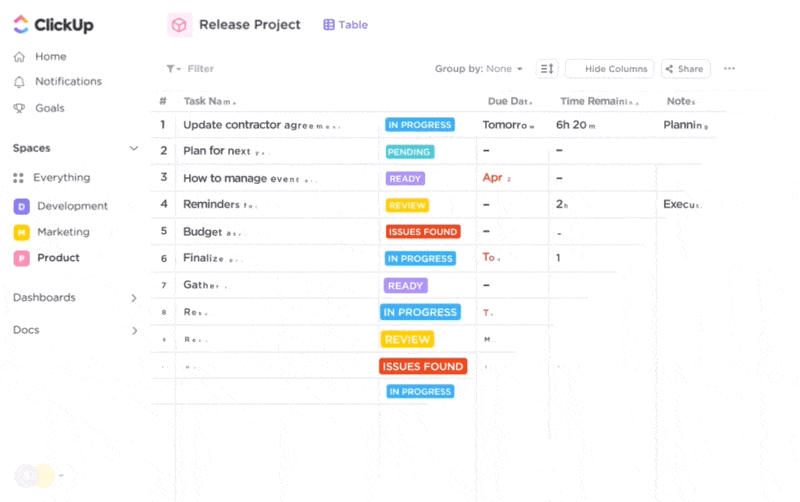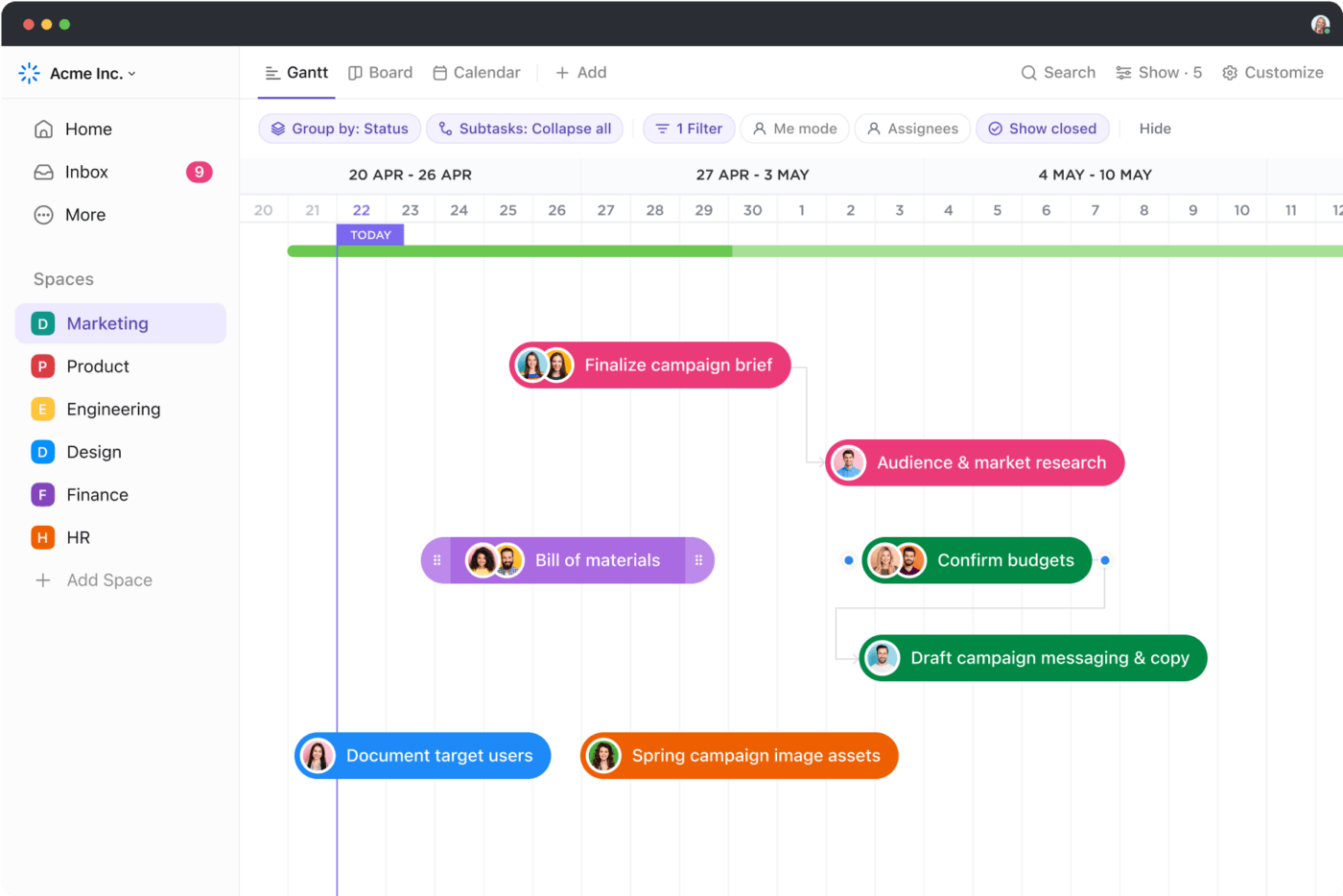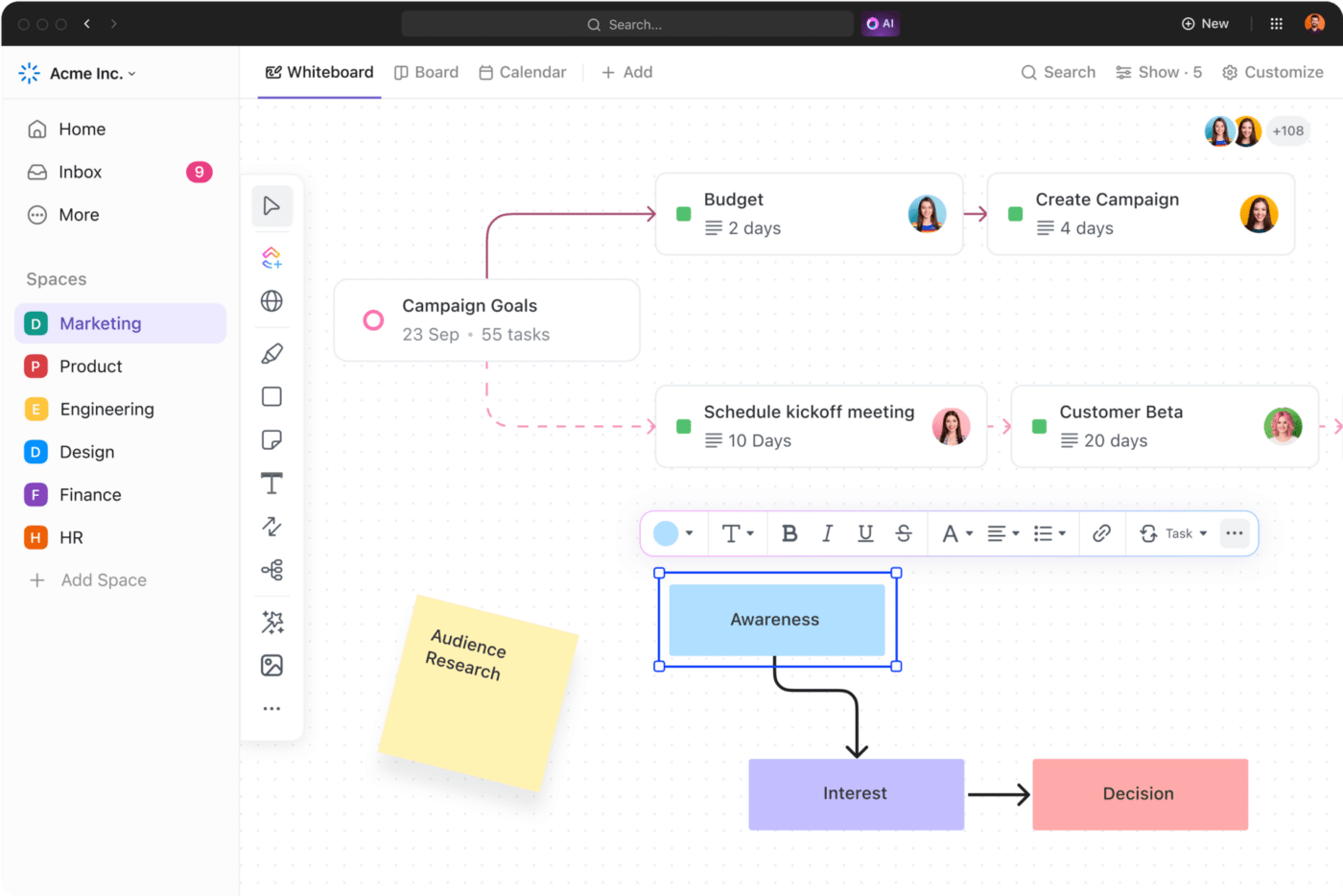

What is essential for project management—team collaboration or task allocation and management? Is one more important than the other?
That’s why people get stuck in the Miro vs Jira debate.
While Miro offers excellent team collaboration options, Jira has robust task-tracking and management capabilities.
In this article, we’ll help you choose between Miro and Jira and provide another alternative. We’ll cover the key features of each platform to help you decide which one best suits your requirements.
Let’s get started.
What is Miro?

Miro is one of the most popular whiteboard tools, known for its visual project management features. Unlike traditional project management and agile tools, it focuses more on visual workflows and collaboration.
Its diagramming and infinite whiteboard features distinguish it from competitors. Adding live presentations and video walkthroughs makes Miro an excellent visual collaboration platform.
Miro features
Miro’s unique selling point is its ideation and visual team collaboration capabilities. Let’s discuss some of Miro’s key features in detail.
1. Miro cards

Create tasks from sticky notes or text notes by converting them into cards. Organize your tasks and assign work to various team members at the click of a button.
Add detailed task descriptions by adding assignees, due dates, tags, and other details. View task status and due dates in a visual dashboard. Drag and drop cards and organize your tasks any way you like.
2. Kanban view

Go to the ‘Apps’ menu to choose the Kanban framework. Arrange your framework in a visual Kanban view to simplify task management.
Create columns and swimlanes at the click of a button and resize your Kanban board by dragging from a corner. Drag and drop swimlanes and columns and organize them any way you like.
3. Integrations
Miro offers easy integration with 130+ apps and tools, including project and task management tools, team collaboration and communication apps, and design tools.
While Miro is a mind-mapping tool, it enables agile project management via robust integrations with tools like Jira and Azure DevOps.
It also provides you with API access to develop customized Miro apps to solve various purposes.
Miro is known for its mind maps and visual workflows. It has over 200 shapes and a vast library of connectors and icons to help you create sophisticated wireframes and flowcharts.
It also lets you create automated workflows to streamline processes and save time on repetitive tasks. While automation is not possible through built-in tools, you can integrate with third-party solutions like Okta workflows.
4. Real-time collaboration
Miro lets you invite team members to your boards to collaborate in real-time. It allows commenting and tagging, real-time multi-member collaboration, and more.
Conduct live video walkthroughs, run interactive sessions, and seamlessly collaborate with your distributed teams using Miro’s collaboration features.
Miro pricing
- Free: For unlimited users with limited features
- Starter: $10 per member per month
- Business: $20 per member per month
- Enterprise: Custom pricing
Compare Miro vs. Mural
What is Jira?

Jira is one of the most popular project management tools that cater to the diverse needs of various project managers. It was developed by the software giant Atlassian and is one of the top tools for agile software development teams.
It simplifies project management by providing various views for managing your tasks.
Jira features
Jira offers several useful features for agile teams. Let’s discuss some of the key features briefly.
1. Timelines

Create timelines with project tasks and their details, such as start and end dates, status, and dependencies.
This is great for sprint planning, general project planning, and task management.
The best part is that Jira offers ready-to-use templates for various use cases and views. You don’t need to start from scratch. You can create a project management timeline in minutes using one of its templates.
2. Agile boards

Jira offers a Kanban view for agile projects to help you visualize your workflow, including the status of various tasks. Easily drag and drop cards and organize them into categories, such as ‘in progress,’ ‘done,’ and ‘to do.’
It also offers specialized sprint planning features, easy task assignments, and progress tracking.
Apart from the timeline and Kanban views, you can also visualize your projects using a Gantt Chart view.
3. Integrations
Jira offers 3,000+ app integrations, allowing you to connect your entire tech stack. The Atlassian marketplace allows you to connect with all types of tools and platforms.
This includes workflow management tools, CRM tools, project management tools, and more. Numerous apps are designed to add specific functionality to Jira and connect seamlessly with the platform.
4. Automated workflows
Jira uses a simple yet effective ‘if, then’ automation model. If certain conditions are met, specific actions will be triggered.
Use this to create automated workflows and simplify project management. It offers various automation triggers and rules for creating simple workflows.
Many prebuilt automation workflow templates it offers are ready to use. Choose the relevant one, customize it to your preference, and start an automated workflow quickly.
5. Real-time collaboration
Jira is an excellent tool for real-time collaboration among team members. Multiple people can work on boards simultaneously and make changes instantly visible to other team members.
At any point in time, you can see who’s online and working on a board, whether in the timeline, list, board, or any other view. You can also see who is editing which card on the board or each cell in the list view.
Jira pricing
- Free: For up to 10 users
- Standard: $8.15 per user per month
- Premium: $16 per member per month
- Enterprise: Starts at $141,000 per year for 801-1,000 users
Miro vs Jira: Features Compared
The most significant difference between Jira and Miro is that Jira is a full-fledged project management tool, while Miro is more of a mind-mapping and brainstorming tool.
Miro offers project management features through tool integrations and prebuilt templates replicating the various project views offered by tools like Jira.
Here’s a quick comparison between the Miro and Jira features.
| Features | Miro | Jira |
| Timeline view | ✅ | ✅ |
| Kanban view | ✅ | ✅ |
| Gantt chart view | ✅ | ✅ |
| Real-time collaboration | ✅ | ✅ |
| Prebuilt templates | ✅ | ✅ |
| Automated workflows | ✅ | ✅ |
| Diagramming | ✅ | ❌ |
| Video chat/conferencing | ✅ | ❌ |
| Phone support | ❌ | ✅ |
| Timesheets/leave tracking | ❌ | ✅ |
| Sprint planning | ✅ | ✅ |
| Predictive analytics | ❌ | ✅ |
Now that you have a brief overview, let’s get into the details.
1. Visual project management tools
Miro and Jira offer numerous visual project management features, including project views like Kanban boards, timelines, and list views.
The critical difference between Miro and Jira is that the former focuses more on visual team collaboration features while the latter offers more robust task management capabilities.
Both tools offer ready-to-use prebuilt templates for various use cases.
However, Miro is not the best option if you’re looking for a robust project and task management tool for agile teams. You may consider one of the Miro alternatives.
Winner: Overall, Jira has an advantage over Miro in project management, as Miro was built primarily as a team collaboration and ideation tool.
2. Automation and workflows
Jira has built-in automation capabilities that allow you to create powerful automated workflows.
You can use the ‘if>then’ logic to create simple or complex automated workflows from scratch. Alternatively, you can use one of its prebuilt automation templates to create workflows for common use cases.
Miro, on the other hand, is known for its process mapping and visual workflows. Its diagramming feature is one of the best in the industry.
However, it offers workflow automation through third-party integrations with tools like Okta Workflows. Despite that, its visual workflow builder is robust, especially given its vast library of shapes, connectors, and icons.
Winner: Jira is better at automation, while Miro is unmatched in visual workflows. It’s a tie.
3. Integrations
Miro offers integrations with over 130 apps, and its functionality depends on these integrations. You will find enough integration options to make the most of Miro and use it to its full potential.
On the other hand, Jira is developed by Atlassian and has access to its complete app marketplace. This allows it to offer thousands of integrations with all tools and platforms.
Winner: Jira is the clear winner here, with its integration with 3,000+ apps via the Atlassian marketplace.
4. Real-time collaboration
Let’s face it: Miro was explicitly designed for visual collaboration and ideation. Its infinite whiteboards and robust diagramming features are nothing compared to the collaboration options it offers.
Your team members can simultaneously work on a project, leave comments, or tag other people. It also allows live video collaboration options.
Does that mean Jira lags behind?
Not by a lot. Jira also allows real-time multi-member collaboration features, which are good enough for small teams. However, it doesn’t support the live video collaboration required for brainstorming and ideation, like the one Miro offers.
So, if you’re looking for that, consider Jira alternatives.
Winner: Miro is a winner in real-time visual collaboration, even though Jira also provides great collaboration options.
5. Pricing
When comparing Miro vs Jira in terms of pricing, you’ll note that both offer similar pricing plans. Both follow a tiered pricing structure, and the prices for their plans are also similar.
Jira’s pricing plans have slightly lower price points, though.
However, we recommend comparing the tools more on their features than pricing. Jira is better for agile project management, while Miro is better for team collaboration and ideation.
Winner: Solely in pricing, Jira has a slight advantage as its plans are more competitive.
Miro vs Jira on Reddit
When we took the Miro vs Jira debate to Reddit, we found that most people weren’t comparing the two tools but were discussing how they could be integrated.
This could be because neither is a direct competitor and was designed for different purposes.
While Jira is a go-to project management tool for agile teams, Miro is a popular brainstorming and collaboration platform.
Both tools offer seamless integration and complement each other’s features. If you combine Miro’s visual workflows and collaboration features with Jira’s task-tracking and issue-tracking capabilities, you’ll find a powerful solution.
Meet ClickUp—The Perfect Alternative to Miro and Jira

ClickUp is the best alternative to Jira vs Miro because it offers an all-in-one solution combining the best features of both tools.
Jira is a good project management tool but can’t match ClickUp’s advanced views. It goes beyond Kanban boards and timelines to provide many more options for project managers to manage their tasks the way they like.
It offers unmatched flexibility and customization options to let you create project workflows that suit your needs instead of having to fit a specific framework.
Want to know the best part?
ClickUp’s capabilities are not limited to project management. Like Miro, ClickUp offers numerous brainstorming, ideation, and collaboration features. From creating mind maps to building workflows using whiteboards, ClickUp offers everything a project manager ever needs.
Let’s discuss some specific ClickUp features that make it a great alternative to Miro and Jira.
ClickUp rival feature #1: Kanban Boards

While Miro is great for collaboration and Jira for project management, ClickUp offers the best of both worlds. It provides more advanced project management features than Jira, with collaboration features similar to Miro’s.
For example, the ClickUp Kanban Board view is perfect for visually organizing all your project tasks. It’s great for agile teams and regular project management teams alike.
You can create tasks and subtasks, assign them to multiple assignees, and track their status at a glance.
Check out the best free Kanban software!
ClickUp rival feature #2: Gantt Chart view

The ClickUp Gantt Chart view is perfect for creating and managing project timelines. It allows you to visualize project dependencies, track task deadlines, and set milestones for your project.
It helps manage complex projects with numerous tasks and strict deadlines.
It offers various Gantt Chart project templates, so you don’t need to start from scratch. Customize and use these prebuilt templates to get a quicker start.
The best part is that ClickUp offers many advanced views for project management. From timelines and calendars to lists and tables, you can organize your tasks and workflows any way you like.
Read on to learn about the best free Gantt Chart software!
ClickUp rival feature #3: ClickUp Whiteboards

ClickUp Whiteboards is a specialized mind-mapping and ideation tool. You also get robust project management features, which is not one of Miro’s strong features.
Besides basic connectors and shapes, ClickUp whiteboards let you embed sticky notes, videos, and more. Its in-app chat functionality boosts team collaboration, allowing various team members to work on a board in real time and share inputs.
Check out ClickUp’s Whiteboard templates!
ClickUp pricing
- Free Forever: $0
- Unlimited: $10 per member per month
- Business: $19 per member per month
- Enterprise: Contact sales for pricing
- ClickUp AI is available on all paid plans for $5 per Workspace member per month
Make Project Management a Breeze with ClickUp
While Jira and Miro have unique features and advantages, they are not end-to-end project management solutions like ClickUp.
ClickUp combines the best Miro and Jira features to deliver a more comprehensive project management solution.
It provides more advanced views than Jira to manage tasks, such as Kanban boards, timelines, Gantt charts, and calendars. It also includes mind mapping and diagramming features similar to Miro. It has all the features you need for effective project planning and management.
Want to explore all that ClickUp has to offer? Sign up for ClickUp and discover the project planning and collaboration features it offers.




